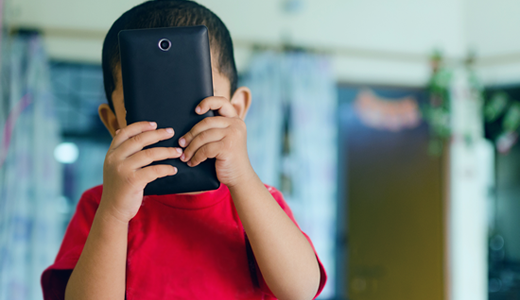How are the combined influences of smartphones and social media shaping the lives of children growing up today? In her new article “Have Smartphones Destroyed a Generation?” in The Atlantic, author and psychologist Jean M. Twenge (Generation Me, iGen) argues that these technological advancements are having a revolutionary—and mostly negative—impact on young people today.
Twenge’s analysis examines how smartphone use correlates with rising teen suicide rates, mental health, sleep deprivation and general well-being. Regarding the latter, Twenge says data from the annual Monitoring the Future survey is unequivocal:
The survey asks teens how happy they are and also how much of their leisure time they spend on various activities, including nonscreen activities such as in-person social interaction and exercise, and, in recent years, screen activities such as using social media, texting, and browsing the web. The results could not be clearer: Teens who spend more time than average on screen activities are more likely to be unhappy, and those who spend more time than average on nonscreen activities are more likely to be happy. There’s not a single exception. All screen activities are linked to less happiness, and all nonscreen activities are linked to more happiness.
She adds, “If you were going to give advice for a happy adolescence based on this survey, it would be straightforward: Put down the phone, turn off the laptop, and do something—anything—that does not involve a screen.”
Twenge’s stern assessment has prompted a raft of responses. Writing for JSTOR Daily, Alexandra Samuel suggests parents need to look in the mirror when it comes to their own tech habits. She also says that instead of focusing on “screen time,” parents must become “digital mentors”: “Mentoring your kids means letting go of a one-size-fits-all approach to kids’ tech use, and thinking instead about which specific online activities are enriching (or impoverishing) for your specific child. Mentoring means talking regularly with your kids about how they can use the Internet responsibly and joyfully, instead of slamming on the brakes.”
But others, such as Psychology Today contributor Sarah Rose Cavanagh, Ph.D., question Twenge’s methodology.
Meanwhile, England’s Children’s Commissioner, Anne Longfield, is speaking out on this issue as well. In an interview with the U.K.’s The Guardian, she said parents need to think of social media usage the same way we think about junk food: “None of us as parents would want our children to eat junk food all the time—double cheeseburger, chips, every day, every meal. For those same reasons we shouldn’t want our children to do the same with their online time.”
Elsewhere this week, writer/director/producer Judd Apatow talked with Vulture about why he doesn’t think conservatives make engaging entertainment. “I know who I am as a storyteller: I want to feel hope about people’s abilities to incrementally learn. This is related to the reason why you don’t see movies and television about Republican and conservative ideas—because Republicans are trying to present themselves as correct, as clean … . And that’s why there’s no incredible, hysterically funny show about conservatives, because they’re too concerned about trying to present themselves as correct. They’re all going, I’m not neurotic. I’m not a disaster in any way. They don’t admit how lost they are. There’s something dishonest to me about that; it’s living a lie.”
Television reunions and reboots, meanwhile, seem to be everywhere these days—often relaunching shows that were popular in the 1980s or 1990s, including Will & Grace, The X-Files, Twin Peaks and Fuller House. But those hoping for a Friends reunion of any kind shouldn’t hold their breath, according to actor Matt LeBlanc, who played the lovable doofus Joey Tribbiani on that NBC series. LeBlanc said in an interview with The Daily Beast, “What story are we telling? Those characters have all gone their separate ways, they’ve all grown up. … That show was about a finite period in people’s lives, after school and before you get married. That time where your friends are your support system. And once that time’s over, that time’s over.”
The NFL’s concussion headache got a lot worse last week, too. Research published in the Journal of the American Medical Association shows that 110 of 111 players studied showed evidence of Chronic Traumatic Encephalopathy. Writing for Sports Illustrated, Charles P. Pierce said, “The person with CTE is not the same person he was without it. An individual disappears into the disease. Someone else emerges—angry, frightened, impulsive, lost in a deep and infernal fog.”
Given the growing scientific evidence showing that football causes brain damage, more and more people are asking questions about the basic morality of the game, with the doctor whose work inspired the film Concussion saying that allowing children to play the game is tantamount to child abuse. “Someday there will be a district attorney who will prosecute for child abuse [on the football field], and it will succeed,” said Dr. Bennet Omalu, speaking at the New York Press Club.
Finally this week, the Alamo Drafthouse has issued an apology for women-only screenings of the film Wonder Woman, admitting that they were actually illegal (at least according to anti-discrimination laws on the books in Austin, Texas, where one of those screenings was held).






Recent Comments